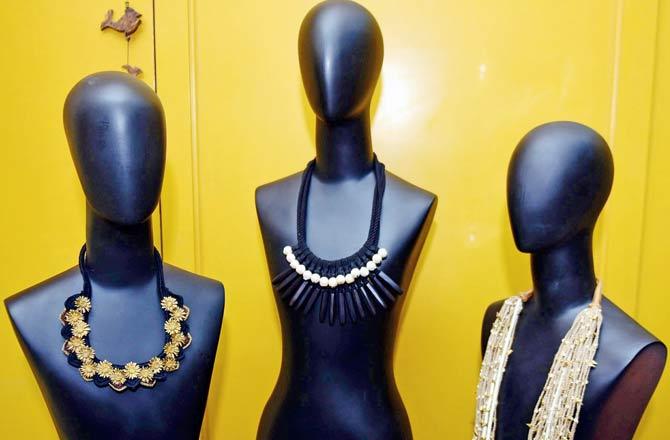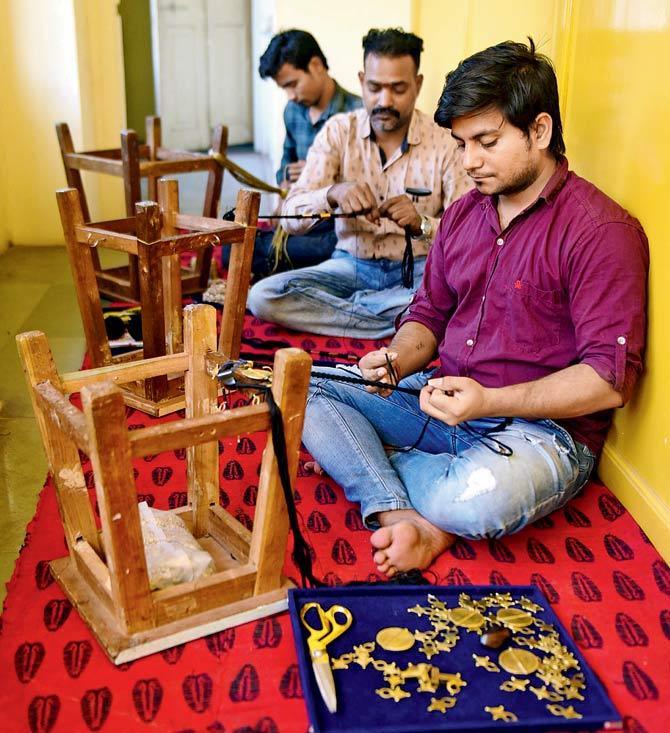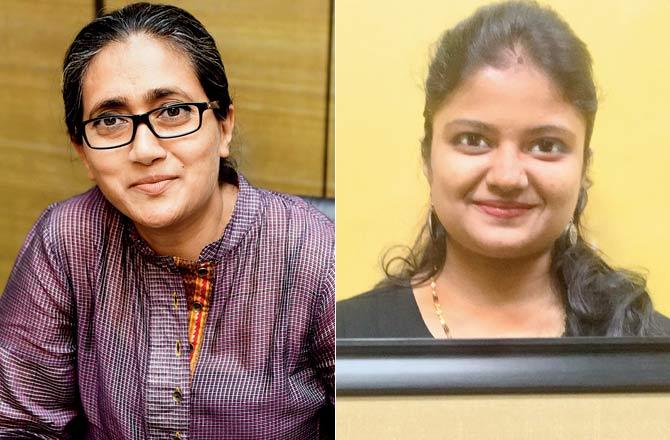Rosalind Pereira and the artisans of her unique jewellery initiative are exhibiting art and independence in equal measure

Mayabazaar women at work
Beads and threads are strewn across a table inside a room with a wooden roof on the fifth floor of a building in Fort that is probably as old as our late grandmother's pickle recipes. Inside, five young women are subsumed in crochet work. One of them is 25-year-old Kanchan Rajesh Behera. She steals quick glances at us. Her lips, painted a bright red, curve into a reserved smile every now and then.
ADVERTISEMENT
A nondescript managalsutra and a thin sliver of sindoor is all she has accessorised her black kurta with, even as she works a large neckpiece dedicatedly, tying it to a frame that will be showcased at an exhibition that begins today.

A piece from Pereira's Ubuntu collection. Pics/Bipin Kokat
She has been working with Rosalind Pereira, the mothership that runs Mayabazaar, since she was 21. Behera recently married her best friend, taking on his name and leaving behind not just a regressive household, but also an abusive past. "Main soch ti thi ki jab mere khud ke paise honge toh main bilkul dashing zindagi jiungi, lekin ab mujhe save karna hai," she tells us shyly.
It is women like her that Pereira is trying to help through her unique artisanal jewellery label which is not just a haven for sustainable fashion that seeks to amplify indigenous handicrafts and weaving techniques, but also a lesson in the role art can play in empowering the downtrodden. "Unlike agriculture, craft is not seasonal," she points out, recalling her journey.

Artisans doing Patwa work
At the age of 26 and after a degree in developmental studies — and a thesis highlighting how craft can be a form of sustainable development — Pereira moved to Delhi to work with Padma Shri Laila Tyabji's initiative Dastkar. It was during her time there, and after visiting various art fairs, that she found her calling.
"I was fairly clear that when I start my own venture it will have something to do with craft. But I didn't want to work on the lines of an NGO. Craft is an economically driven skill and it has to be sustainable from day one. Let's take a look at what happened with the mirror work artisans from Gujarat. In the '80s, when there was a famine in the state, charities started contributing to NGOs which in turn employed the artisans there.

Rosalind Pereira and Kanchan Behera
Exquisite handicraft was being produced at shorter intervals, so naturally the work was shoddy. As a result, when these products didn't sell, the artisan, who was used to being paid R500, eventually returned to work on the roads. This is artificial and not real development. Also, people will buy something out of pity only once, but if it's of good quality, they will buy it anyway," Pereira says underlining the principle behind the label.
To call the neckpieces, rings, earrings and bracelets — created by these women under Pereira's tutelage — detailed, would be to say the least. These are trinkets bearing the emblem of many stories: that of the struggles of women who have transcended poverty, patriarchy and class discrimination to emerge as independent artisans in their own right. And from Pereira's travels, which have found meaning in flowers from the Tanzania's Ngorongoro Crater cast on brass or in neckpieces adorned with crocheted korus (a spiral shape depicting the unfurling of a new silver fern) sacred to New Zealand's Maori tribe.
It makes sense then, that in 1997 when she began her journey with sustainable fashion, Pereira's research led her to Sion where drought-impacted Charakkam and Patwa Kam craftsmen from Uttar Pradesh and other areas of the Hindi belt were looking for odd jobs.
"These talented artists would have been coolies and stone-cutters," she sighs. Her team grew gradually as people got in touch from various arenas, and what was once a makeshift workshop in her Bandra apartment's living room, has now travelled all the way to Paris's Premiere Classe exhibition. "I know that this is a very unorthodox way of running a business but I believe in this process," she shares.
Till December 8, 11 am to 7 pm
At BARO, 12, Sun Mill, Lower Parel.
Call 40344888
Catch up on all the latest Mumbai news, crime news, current affairs, and also a complete guide on Mumbai from food to things to do and events across the city here. Also download the new mid-day Android and iOS apps to get latest updates
 Subscribe today by clicking the link and stay updated with the latest news!" Click here!
Subscribe today by clicking the link and stay updated with the latest news!" Click here!






